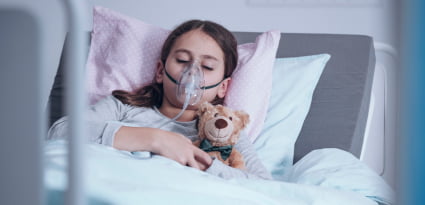
‘Sweet, funny, and seriously tough’: The six-year-old girl beating acute leukemia against the odds
Six-year-old Aleena’s leukemia relapsed early in 2025, putting her life at risk. To mark Blood Cancer Awareness Month, JHAH clinicians tell the story of her battle against life-threatening complications. Her name has been changed to protect her identity and images accompanying this article are posed by an actor.
In late 2021, three-year-old Aleena was diagnosed with acute lymphoblastic leukemia (ALL), a rare form of cancer that affects bone marrow and blood. ALL occurs when a malfunctioning bone marrow cell grows and divides out of control, which floods the body with immature white blood cells that impede healthy cells.
“It’s a variant of leukemia that is typically very curable,” Dr. Basel Abushullaih, hematology and pediatric oncology consultant at Johns Hopkins Aramco Healthcare (JHAH), says. “It’s the variant we see in about 90% of childhood patients who are diagnosed with leukemia. The cure rate is also about 90%.
“Immediately after her diagnosis, we gave her the standard course of treatment for acute leukemia. She was treated for two years and then went into remission and did very well.”
After being discharged from hospital, Aleena visited doctors at JHAH for check-ups visits every three months. Unfortunately, in February 2025, between check-ups, she began suffering pain.
“I did a blood test, and it showed the presence of leukemia cells,” Dr. Abushullaih recalls. “So, she was in the unfortunate 10% of patients who relapsed. And if a patient relapses, treatment becomes more complex and more intense, which severely weakens their immune system and means they are less able to fight infection. She was admitted to the pediatric intensive care unit and treated immediately.”
Dr. Abushullaih says Aleena’s readmission was incredibly hard on her parents. “It’s tough for them to have to see their daughter go through chemotherapy again and spend weeks more in hospital. We did all we could to comfort them and carefully explained how we were treating her.”
Aleena was given intense chemotherapy to kill the new leukemia cells but her weakened immune system meant that she developed several infections that created an extreme risk to her life.
“She was critically ill, and her case was extremely complex,” Dr. Hanan Al Shaikh, Chair of the Women and Child’s Health Department at JHAH, says. “Her care team discovered several life-threatening conditions including multidrug-resistant bacterial infections, severe viral illnesses, and a rare, disseminated fungal infection caused by Aspergillus species, which carries a mortality rate exceeding 80%.”
The odds were stacked against her — but Aleena pulled through.
“We see some miracles in our line of work, and this was definitely one of them,” Dr. Al Shaikh says.
A key element of Aleena’s ongoing treatment plan is blinatumomab, a new drug that is drastically improving survival and outcomes for leukemia patients. Blinatumomab is a type of immunotherapy — a treatment that uses the body’s immune system to help fight cancer. It targets a protein found on the surface of both leukemia cells and the patient’s healthy white blood cells, effectively binding them together to encourage the white blood cells to destroy the leukemia cells. It is not a form of chemotherapy but is used alongside chemotherapy.
“We are seeing excellent results with blinatumomab, which is now a standard treatment for all leukemia patients, whether or not they have relapsed,” Dr. Abushullaih says. “It enhances survival rates and it’s making a huge difference to the lives of our leukemia patients.”
Aleena was discharged from hospital and continued to receive treatment as an outpatient. Leukemia patients and their families also have direct access to JHAH clinicians if they detect new symptoms.
“There is a broad spectrum of responses among relapsed leukemia patients,” Dr Abushullaih explains. “Some patients respond very well, whereas others require significant further treatment, such as a bone marrow transplant and CAR-T cell therapy.”
For Aleena, things are going well. “She responded excellently to induction treatment,” Dr. Abushullaih says, referring to the initial, intensive phase of treatment designed to rid the body of leukemia cells. She is now in remission.
He says of Aleena: “She’s a young child, so it’s hard for her to fully comprehend what she’s going through. But she’s very sweet, funny, and seriously tough. And her family give her all the love and support she needs.”
